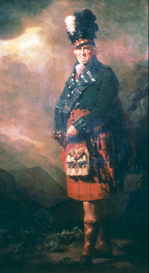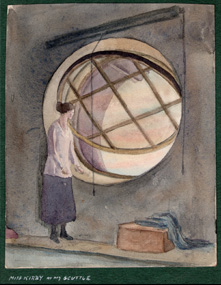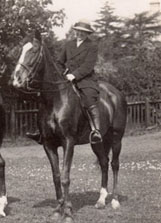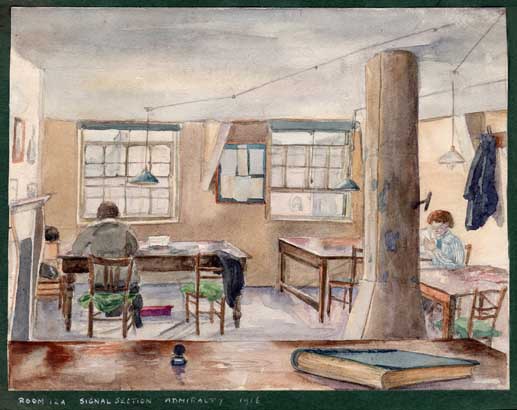Another thing I must write about is War Work. We still had maids – our most-liked house-parlour maid, for whom Mother had to tackle a slow lover – and other not bad girls. When war came, for a short time, I worked at interviewing women who were hoping for a small help in money, until army pay should come through, their husbands having been called up immediately. I gave up the job after having to give evidence against a woman who had lied about her right to help. Much of the wives' explanations were very quaint. When asked what regiment her husband was in, one woman could give no idea and – when urged to think how this could be – said, "Well, I suppose I wasn't interested." And their versions of regimental, and especially of gunnery, names were very strange.
I heard that my old school had started a class for Old Girls, to learn technicalities which might help to fit them for jobs that had not touched women before. What it taught me was that Offices like War Office and Admiralty were asking for girls. So, with Darling Mother's permission, I applied to the Admiralty and was allowed to wait a few days for a possible vacancy, because of my Naval connections – Father, Uncle, cousins, only brother, who were all in the service.
The vacancy turned up, and I was given a job in the Signal Section (soon to be Division) and went up to be put up, till I found where to live, by Aunt Vivi. (Her three sons – Archie, Paul and Pat – and the fourth, Leo, were soon to be all at the Front, whence all but Leo did not return.) Soon, Evelyn Mason most kindly asked me to live at their home in Curzon Street. Evelyn, Violet and Rhona were nursing at the Hospital for Officers, which Evelyn had opened in her house in Bruton Street (which she and Jim had bought to bring out Violet).
Our little branch of the Signals worked in Room 12, in the old part of the Admiralty, on the left of the main building, in the right flank as you go in. You got to it by lift or stairs. The old fashioned, rickety lift was little used, as someone always left the door at top or bottom open, so most of us took the stairs. The old wooden stairs were so steep, dark and twisting that one felt back in Nelson's time. The room, though, was light and pleasant. Everyone was a worker, with a very good and extremely nice Head (Miss Jupp). We were a mixed bag, but all were willing, and we all became friends.
Our job there was to set Codes through the press, and it needed very great care on our part and on the Printer's. I started a little feud with the Chief Printer, about printing accents on Capital Letters. You can't signal an accent. We kept the feud going, on both sides, for fun. Among others, we had work done by the Oxford University Press, which was far and away better than any other. (After the war, Violet Mason took me to the Press, and I met the Printer, which was great fun.)
 As work in the Division increased, our first move was to the nicest of all our rooms, a first floor on the Haymarket that looked straight down and into the ground floor of the well-known Dewar House, and we could see their collection of Scottish pictures. I managed to get Miss Jupp to go with me to the exciting auction of the portrait of "The McNab" by Henry Macbeth-Raeburn and saw it sold at Christie's for, perhaps, the first of the enormous picture prices – I think it was £25,000 odd. We then saw that in the same room hung Landseer's "The Monarch of the Glen".
As work in the Division increased, our first move was to the nicest of all our rooms, a first floor on the Haymarket that looked straight down and into the ground floor of the well-known Dewar House, and we could see their collection of Scottish pictures. I managed to get Miss Jupp to go with me to the exciting auction of the portrait of "The McNab" by Henry Macbeth-Raeburn and saw it sold at Christie's for, perhaps, the first of the enormous picture prices – I think it was £25,000 odd. We then saw that in the same room hung Landseer's "The Monarch of the Glen".
We were a happy ship, a very merry crew. Never had a real quarrel, and everyone worked. After a time, and to our very real sorrow, Miss Jupp was told by her doctor that she must give up. It was too much for her. The two others (who always worked together) left for another job. So, I came in for the job of Head, and the running of the room fell to me. We never had any trouble. All worked hard, and all were friends.
 Our next move was to a large room in the top story of a building, on the other side of the street, with high-up windows. It was a fine room, but without the pleasantness of the corner opposite. My first little difficulty was raised by the N.O.'s wives, who were very angry, because I did not intend to demand another room, as they did not like it.
Our next move was to a large room in the top story of a building, on the other side of the street, with high-up windows. It was a fine room, but without the pleasantness of the corner opposite. My first little difficulty was raised by the N.O.'s wives, who were very angry, because I did not intend to demand another room, as they did not like it.
When the Bersaglieri came through the Haymarket with their splendid running march, I could not resist the temptation, and I shouted "Avanti Savoia" (Forward Savoy). Every head of the marchers turned up to the window.
During my time in Signals, I stayed with Evelyn Mason, except for two short breaks, when Mother came up to London. The first time, Elaine (nee Jump) lent her house to Mother for a time. Later, Mother came up for the winter to a horrid little hotel in S. Kensington, and I joined her. I developed German measles during the first time, which did not, as I feared, delay my size. Mother and I enjoyed some walks, even got to Hampstead.
 The war coming to an end, and the question of staying on or not had to be decided. The time came to let go any who did not want to stay on, and I knew that we could not live genteelly in London on our joint income. So, I retired and returned to Darling Mother, who was getting old and not comfortable alone. I went home to Ashmead, gradually cut our staff down to nothing, and lived a very quiet life. I began to go to meets of the Essex and Suffolk and soon became a regular follower on foot. I took to following hounds once or twice a week and gradually made friends of most of the hunt. Everyone was kind. The MFH became a neighbour in our quiet corner, and his groom used me, to my great enjoyment, to exercise the lovely little chestnut that won [blank space]. I took her for two or more hours every morning and rode her to the meets before she got a [blank space].
The war coming to an end, and the question of staying on or not had to be decided. The time came to let go any who did not want to stay on, and I knew that we could not live genteelly in London on our joint income. So, I retired and returned to Darling Mother, who was getting old and not comfortable alone. I went home to Ashmead, gradually cut our staff down to nothing, and lived a very quiet life. I began to go to meets of the Essex and Suffolk and soon became a regular follower on foot. I took to following hounds once or twice a week and gradually made friends of most of the hunt. Everyone was kind. The MFH became a neighbour in our quiet corner, and his groom used me, to my great enjoyment, to exercise the lovely little chestnut that won [blank space]. I took her for two or more hours every morning and rode her to the meets before she got a [blank space].
SIGNAL SECTION
Admiralty records being as vague and incomplete as they are, no one really seems to know when this Signal Section was formed and assigned to Room 12 in the Old Admiralty Building. EV would not have joined before Summer 1915 (having been in Nice for the 1914-15 winter), but it seems most likely that she joined sometime in late 1916. Her watercolour of Room 12A is dated 1916, so we know that she was there, at least, by December 1916. Her mention that the Signal Section would be "soon be" changed to Signal Division argues against her joining much before late 1916, since this name change would occur in August 1917.
AUNT VIVI
Evelyn Adela Bootle-Wilbraham, married to John Gordon Kennedy, and first cousin to EV's mother.
KENNEDY COUSINS
Sons of John Gordon Kennedy and Evelyn Adela Bootle-Wilbraham. Paul Adrian "Paul" Kennedy, Killed in Action on May 9, 1915. Archibald Edward "Archie" Kennedy, Killed in Action on August 26, 1914. Aubrey Leo "Leo" Kennedy, would return home and later become Assistant Foreign Editor of The Times. John Patrick Francis "Pat" Kennedy, Killed in Action on April 24, 1918.
EVELYN MASON
Evelyn Mason Lindsay, daughter of James Ludovic Lindsay (26th Earl of Crawford) and Emily Florence Bootle-Wilbraham, making her the daughter of EV's mother's cousin. Wife of James Francis Mason of Eynsham Hall, Witney, Oxfordshire, England.
EVELYN, VIOLET AND RHONA
Violet Sybille Mason and Rhona Margaret Alice Mason were two of Lady Evelyn Mason's daughters.
LADY EVELYN MASON'S HOSPITAL FOR OFFICERS
16 Bruton Street, Berkeley Square, London, England.
OUR FIRST MOVE
We may be wrong, but the only building that fits the bill (and fits it most perfectly) is the Burberry's Headquarters building at the corner of Haymarket and Orange Street. Until more conclusive information is available, we will assume that Burberry's leased (or donated) the first floor of their brand new building for use by the War Office.
DEWAR HOUSE
11-12 Haymarket, London, England. The company headquarters of John Dewar & Co. Near the corner of Haymarket & Charles II Street.
THE McNAB
This painting of Francis MacNab sold at Christie's on July 6, 1917, in an exciting auction with 49 bids, for the then-unheard-of price of £25,410. It is currently owned by the Japanese investment firm which purchased John Dewar & Son.
MONARCH OF THE GLEN
In 1884, this painting sold for 6,200 guineas; in 1894, for 6,900 guineas. On May 11, 1916, it sold to Thomas Dewar for 5,000 guineas.
MISS JUPP & ELAINE JUMP
We have been unable to identify these women.
NEXT MOVE TO A LARGE ROOM
On the opposite side of the street from the Dewar House, this is the building in which EV painted a picture of a Miss Kirby standing at one of the windows (which EV called her scuttle). EV's "scuttles" are still in place, actually, and allowed for our quick identification of the building.
BERSAGLIERI
A corps of the Italian Army (Bersaglieri means Marksmen). This light infantry unit was known for the distinctive use of feathers attached to their helmets and their "splendid running march".
ASHMEAD
Their own home at 27 Graham Road, Ipswich, Suffolk County, England.
ILLUSTRATIONS
1) Room 12 A, Signal Section, Admiralty (London) — watercolour by EVJ
2) The McNab by Henry Macbeth-Raeburn
3) Miss Kirby in the Signal Section Room on Dewar Street — watercolour by EVJ
4) Eleanor Jauncey at a Hunt, March 1933
Text and images may not be
used without written permission.
Click for Contact Information
